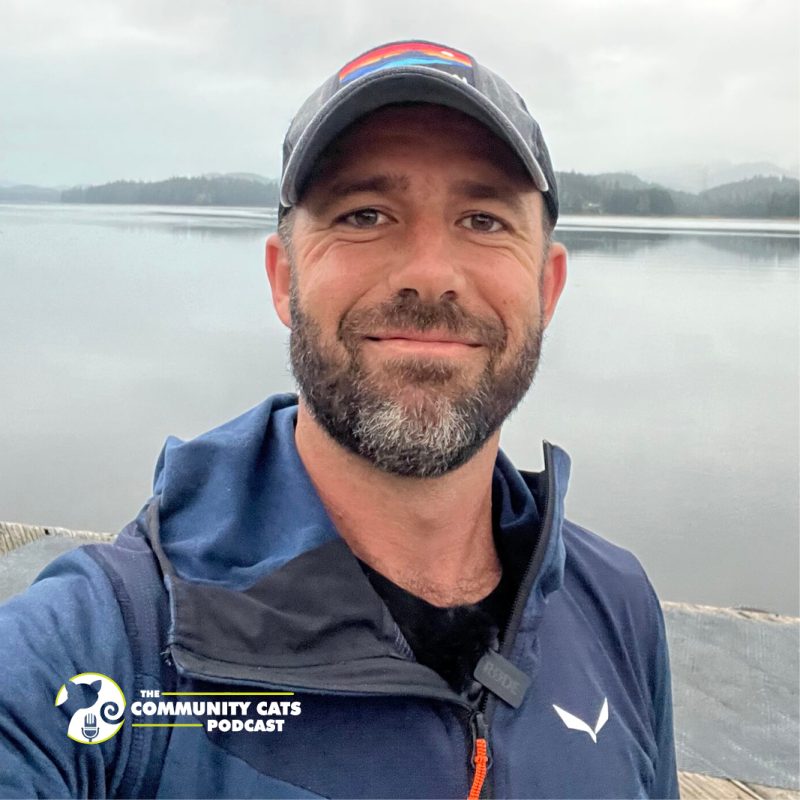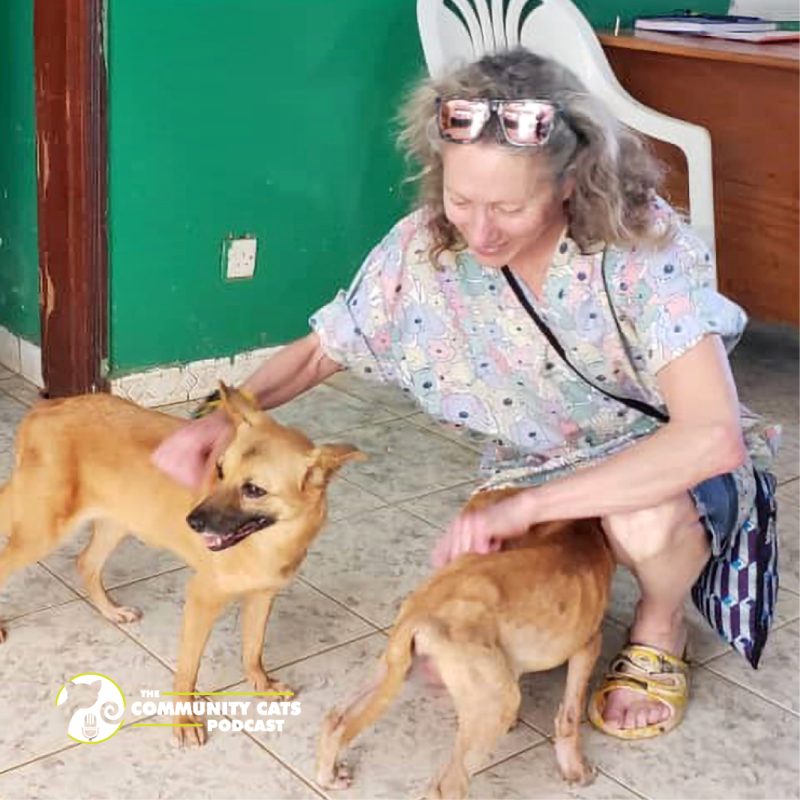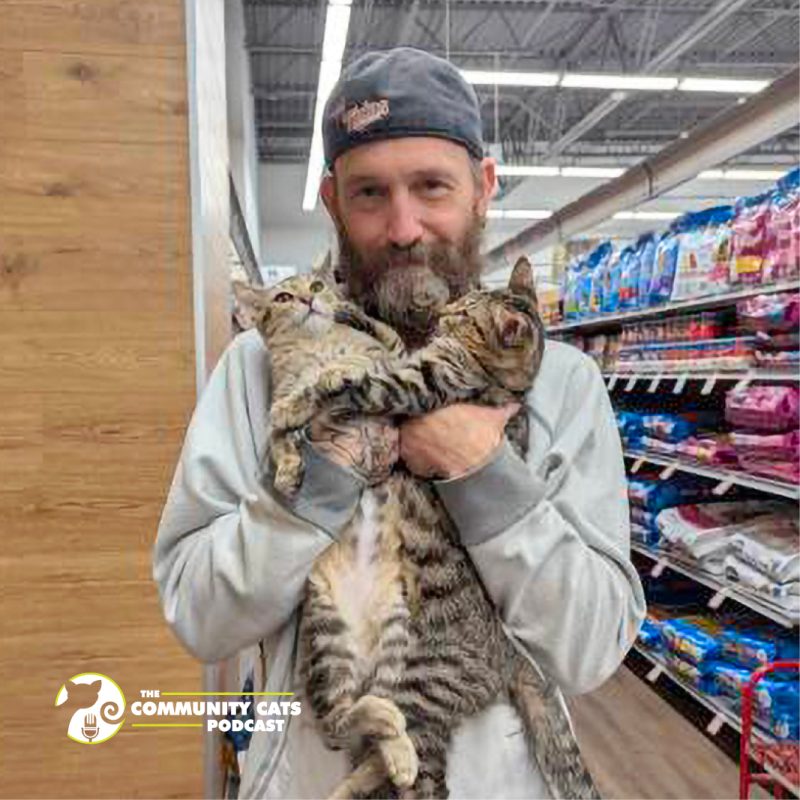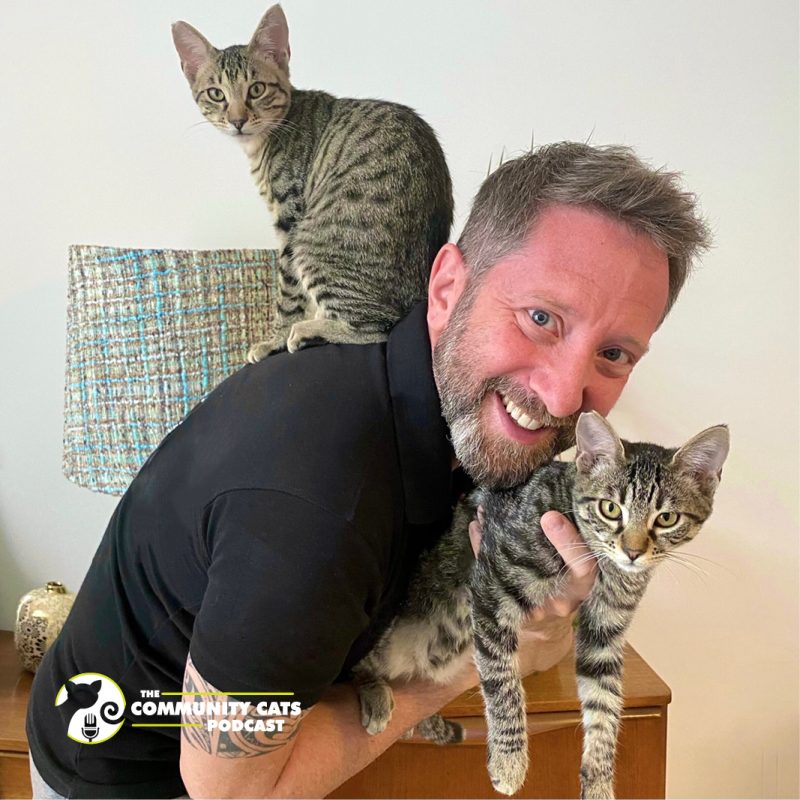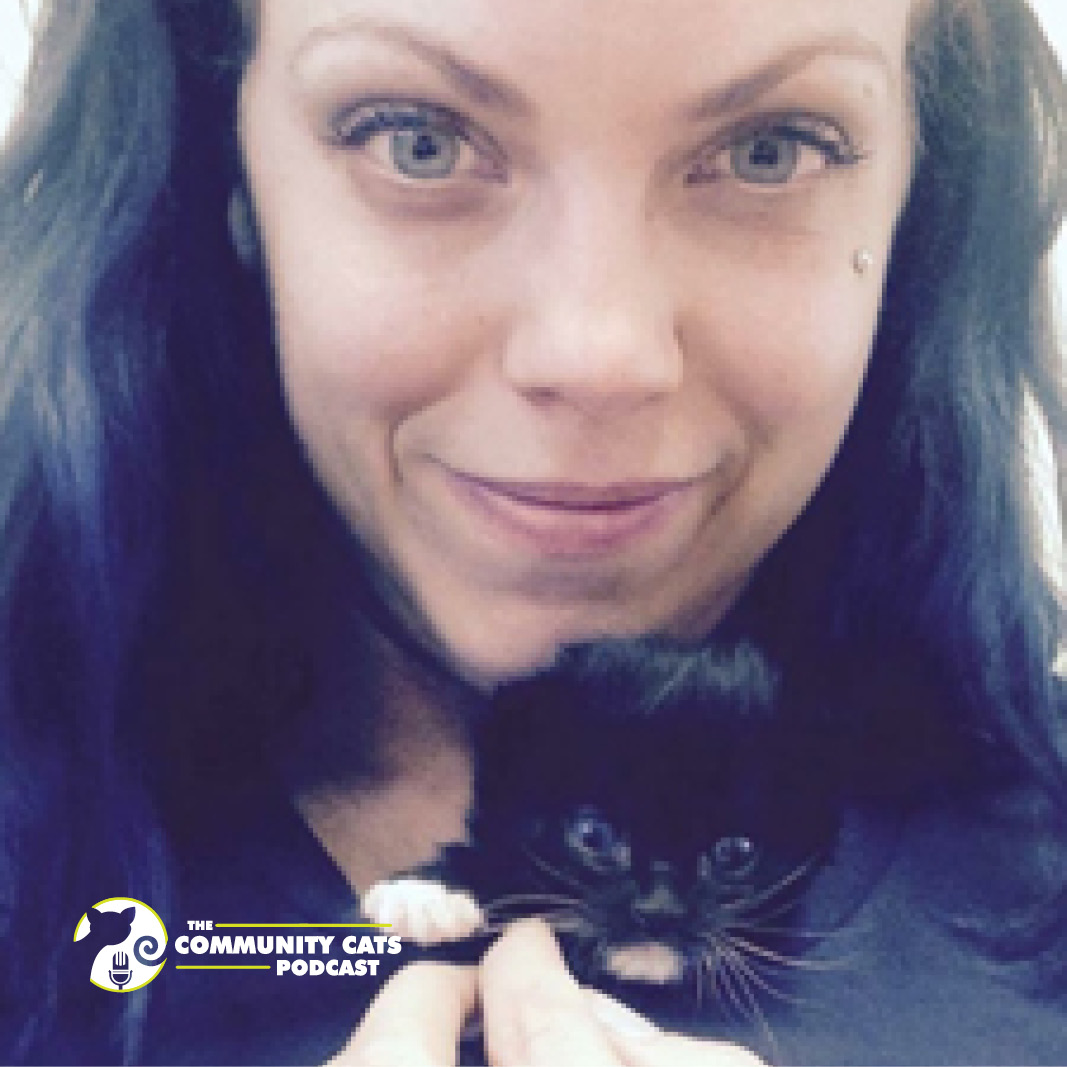
Mariah McCulley – Director of Operations at Animal Friends Alliance
March 16, 2021
Book Reviews
March 25, 2021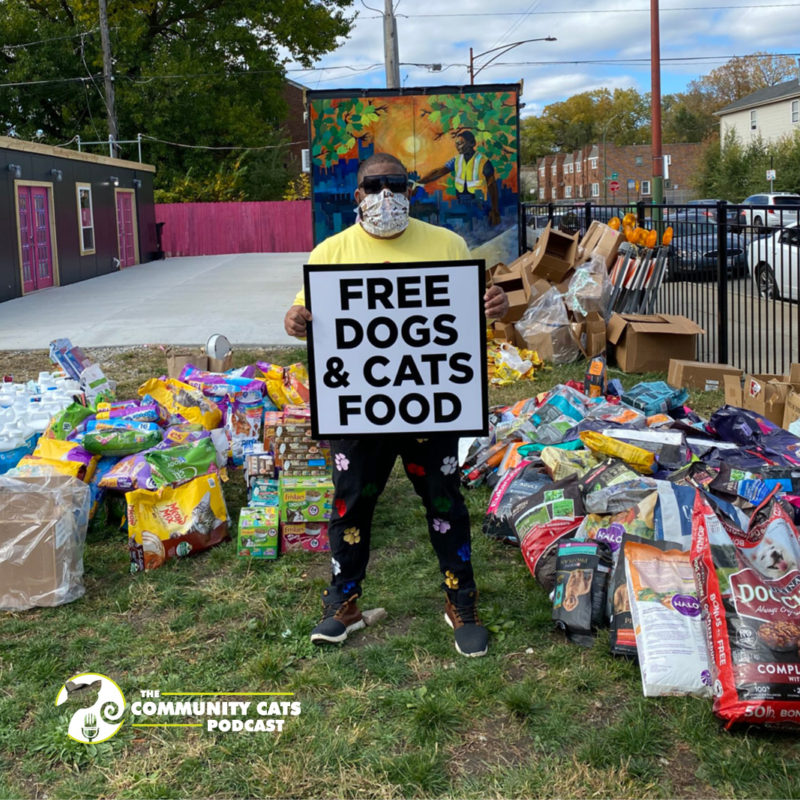
“With Paw Salvation I noticed something, they were kind of baby steps. I first started with just feeding homeless pets, then I started taking care of them, I started adding veterans and seniors, then I’m now looking to go into wellness and grooming. At some point very soon I’m also looking at going into flea treatment and microchipping.”
Listen to Episode #396 Now
This episode is sponsored in part by TICA and Doobert.com.
This week, an inspiring chat with Peter Elueze, founder of Paw Salvation, a Chicago-based nonprofit that helps homeless people, veterans, and seniors care for their pets. Paw Salvation was founded 3 years ago and has been growing steadily, supporting those who need it by providing pet food.
Stacy and Peter talk about the human-animal bond, the need for including pets when providing housing and writing policy for homeless people, how COVID-19 has affected homeless people, advice for starting a nonprofit, and finding blessings in unexpected places. Peter also shares his plans for a mobile grooming and wellness van and his hopes to be able to include flea treatment and microchipping in the future.
To help Paw Salvation in their mission, donate or follow them on Instagram or Facebook. To find out more, visit Paw Salvation’s website.
Read Episode #396
Kristen Petrie [00:00:02]
You've tuned in to the community cats podcast. Ready? Let's go!
Stacy LeBaron [00:00:13]
Welcome to the Community Cats Podcast. I am your host, Stacy LeBaron. I've been involved helping homeless cats for over 20 years with the Merrimack River Feline Rescue Society. The goal of this podcast is to expose you to amazing people who are improving the lives of cats. I hope these interviews will help you learn how you can turn your passion for cats into action. And today, we're speaking with Peter Elueze. Peter is with Paw Salvation. Paw cares for the homeless people who own pets. They make sure that they have all that they need to keep their companion pets with them. They also care for veterans and seniors who also own pets and need help with their pets. You can find out more details about them on Instagram at Paw Salvation or on Facebook by just searching Paw Salvation Incorporated and see more of their outreach and involvement in the community. Peter, I'd like to welcome you to the show.
Peter Elueze [00:01:05]
Hey, how you doing?
Stacy [00:01:07]
Good. So thank you again for joining us. I wanted to first ask you, how did you get passionate about cats?
Peter [00:01:15]
I got a passionate about cats because I see them most of the time. I have one particular one, it comes to the front porch. Every morning once she sees me walk out, like, Can I have some food? And I'm like, okay. So I start stocking up on cat food. That was long before I became Paw Salvation. Also had me thinking, like, who cares for them. There's sometimes where you go downtown Chicago or you go to Wacker Drive, you see these homeless people with cats, dogs, and I keep asking, if they give them money on the streets, that's not enough for them and their cats. So what happens to the cats? So I decided, okay, let me help them with their animals while they have one less thing to worry about. So if I give the animal food, health care, and all he needs, so whatever they make on the street is enough for themselves, and they don’t have to split it between themselves and the animal.
Stacy [00:02:08]
So, for the folks that you do help in Chicago over the years, what percentage of them have dogs versus cats?
Peter [00:02:14]
Most of them have cats because—I would say the ratio of people that have cats is about 60%—because I noticed cats are easier to just pick up and move. So you see mostly cats rather than dogs. So most of them have cats, yes.
Stacy [00:02:31]
Do you see any of them feeding feral cats or colonies of cats, you know, communities?
Peter [00:02:35]
Yes, the homeless people have their personal cats, but what we do at the Paw Salvation is -- we started in Chicago, but we do outreach in New York, we do outreach in Ohio, we do outreach in Maryland, everywhere technically because the way it's set up, if you need help, you send us the message, we’ll send you boxes of food. So we have people that feed the feral cats in New York, some in Florida that will send us a message. “Hey, I have a colony of cats. How can you help?” Okay. Send me your mailing address. Yes, so box of food, treats, all that they could need for the colony to get, to keep them going. So we said it is colony. We make sure that once a month we send them a bulky, sizable amount of food, dry food and wet food. If it’s just someone who lost income because of COVID, we know the cat is indoors. So there’s enough for their personal cat. So depending on the number, if it was a personal ownership, that's different than if it’s someone who feeds a colony. You know what size to give them to keep them going.
Stacy [00:03:39]
Wow, that's amazing. So you're basically wherever there's a need you’re responding to that need. How long have you been running Paw Salvation?
Peter [00:03:49]
Paw Salvation has been running a little over three years now, but we got our 501(c)(3) about two years ago. So unofficially is been three years. Officially it's been two years.
Stacy [00:03:58]
And how do you get food that you distribute out to all of these people?
Peter [00:04:03]
It’s been a blessing because most of the time, some hospitals will say, Hey, we have some food. Can we donate some food? Sure. I'll drive there, pick up some food. We have Rescue Park Chicago, they donate food to us as well. We have private people that say, Hey, I don't have cash, but I have some cat food or some dog food. Is it okay that I send it over? Yes. So if they are in Chicago, I go pick it up. If it’s a lot for them to ship, I go with me somewhere. I pick it up. If it's not too much, they just mail it to us and we receive it. So most of the time we get it from private people and only company right now that is giving us some food is Rescue Park Chicago.
Stacy [00:04:46]
I actually found out about you, you were on a TV, an episode of a TV show, a news show. You want to talk a little bit about that opportunity?
Peter [00:04:55]
That was, that was a miracle. I was just about on the street downtown, feeding the homeless cats. Somebody just walked up to me and said, Hey, what do you do? I explain to him. It's like, okay, and he walked away. So when he give me an email address to mail him what we do, and the next thing is, I got an email saying, oh, we want to feature you on ABC 7. So I really didn’t understand it, being featured on ABC 7. I didn't even know what ABC, I didn't really know that the weight of what it was. So I was like, okay. I told my wife about it. She was like, “It’s big. So what's going to happen now?” So when she said it’s big, I get really scared. Okay, I don't really know. So it was a three-day shoot because the first day we went out to the street to meet the homeless people. The other day it was on Windy City Live. It was a live show. I have never been on the live show before. So it was a blessing. It was a blessing.
Stacy [00:05:49]
I'm going to ask you a question if there are folks out there. I meet folks all the time. I run these monthly trapper training certification programs, and 60% of the people who join us for those trainings are trapping feral cats, feeding feral cats, taking care of them, loving them. They're all doing it, all on their own. And some of them feel the need and want to become a nonprofit organization because they need extra money to help, you know, the donations to help make it so that they can care for their colonies as well as maybe expand and help some other colonies and other communities. What recommendation or advice would you give somebody thinking of starting a non-profit?
Peter [00:06:29]
The advice I would give someone trying to start a not-for-profit is first, they have to be passionate because when I first started, I was thinking I was going to get funded. I didn't get funded. It got to a point where I almost said, you know what, maybe I should just stop because the timing of this COVID. Most people don't really want, let’s say, are not really willing to donate as much as before COVID. Everybody's kind of like holding onto whatever they have because it's uncertain and everything. For months you will see no donation, sometimes 30 bucks, 40 bucks, but we have a group of people that now depend on us for food, and sometimes you give them little cash. So most of the time I do dog training on the side. I do dog grooming on the side. I do dog and cat sitting on the side. So more than often, I always have to come out of pocket to make sure and meet the needs of this community that are very dependent on us already. I don't want to ever find myself in a situation where they’re calling, Hey, we're running low on cat food and I'm like, we don't have donations. Now that will break that person's heart. So God has been faithful. He meets me at every point of my need, and He just provides. But as for donations, the person has to just understand that it may not come. If it doesn't come, what are you going to do? Will you still be able to function? What if you are trying to function solely based off of donations, that may not happen. That may shorten the lifespan of that not-for-profit. So you should have like a back-up plan of okay, they’re no donations. What can I do? Can I go to Petco? Can I go to PetSmart? Who can I talk to? And say, hey, I don't have money. This is what I'm trying to do. You guys have food almost going bad, almost going expired, or whatever they want to donate. That way it's been almost six to seven months since we got a cash donation, but we always get food, which to me is a blessing. So they just need to be sure that they really want to do this because sometimes it can get a little bit emotional and tiring.
I remember when COVID just hit, when there was shelter in place in Chicago. I sat down one day. I asked myself, Okay, if everybody's home, who's going to care for these guys, because these guys depend solely on people, on the foot traffic? So there's no foot traffic. They starve, their pet starves. That's what's going to happen. So all through COVID I was out there every week, making sure I give them food for them self, food for the animal. Sometimes, I'd give them a bus pass. I take care of them because at some point it became not just the animal now, but the owners because you meet them sometime, and they be like “hey Jay, remember the dollars on the street,” like okay, it's fine. Take this one. Take this for your cat. But if you need something else, let me know. So if I started as just the animal but it's now like a more personal thing and you get to know the person one-on-one and I've been looking for volunteers for a while now. I notice something. Most of the homeless people that I know, they now have homes, they’re my best volunteers because they know the streets. They know the homeless. They know how to find them. So they would have send me an email. Hey, Jay. I saw this dude on 87. This is his name. Can you go help him out? Yeah. Sure. They know we always come through. Regardless, they know, just shoot him an email. Then we have these people that come from out-of-state going by Chicago. We have pets. It's like they have their own communities. These homeless people have some kind of network I'm trying to understand. Because whenever I meet new people out of state almost every week, and it's from one person I’m already helping. Here, call this number if you need anything and you’ve got an animal, just text this guy and he’ll come. And they text and I showed them. Oh, we just got your number and they say you going to come away. Not too sure, but we just tried it and you came. So I always make sure that number is like a 911 number for your pets. If you are in distress regardless of where you are, we will figure you and set you up.
Stacy [00:10:36]
You've got some great plans up ahead. You talked about the fact that you've done some pet grooming in the past and you have the vision for mobile grooming wellness fan. You want to share a little bit about that?
Peter [00:10:48]
Yes, when you're out there every day, you meet them. You see, you interact with animals almost every weekend. You notice, even if you give them the high-quality food, most of the time these animals still need some kind of check-up. So I said, okay, can they afford a vet check? No, they can't. They can barely eat. How much more to take their pets to the clinic? So I said, okay, why don't I come up with a roaming, like a bus converted into a vet station and a grooming station? That way, once a month or once in two months, we go around travel around with a vet tech and a doctor to examine pets and make sure they’re okay. So whatever we give them as food it shows, that they look presentable and healthy. And I know for a fact they did not have grooming in forever. That's most of the time they look dusty, or whatever. They’re coats don't look as shiny as—because the truth of the matter is, regardless of them being on the streets. I have dogs. I have cats. I would not let my cats or my dog look the way theirs is looking. So their dog or their cat has to look like what mine is looking like. So that's why I'm concerned about the animal’s coat, the way it looks. You can tell he needs some kind of attention. So that's why I'm trying to like go one step further to make sure we include or incorporate routine vet checks and a grooming, making sure these animals look okay. Because the moment him, as the owner of this pet, sees something positive happening to his pet, his hope for him sometime very soon.
--Start mid-roll advertising –
Stacy [00:12:22]
Celebrating the welfare of all cats. The International Cat Association, also known as TICA, is the world's largest feline genetic registry and is the number one registry of household pet cats and kittens. TICA was the first, and now the world's largest registry, to allow household cats of unknown ancestry to compete for the same titles and awards as pedigreed cats. Whether you adopt or shop, TICA is the one-stop shop for all things feline. TICA is more than 65,000 members and clients in a hundred and four countries who all speak the language of cat lover by helping make an impact on the health and welfare of all cats. Members and clients serve to educate and foster spay/neuter awareness in their local communities and are active. volunteers at local animal shelters and animal outreach programs. TICA takes an active role in numerous citizen advisory groups to foster legislation to aid the health and welfare of all cats. To learn more about TICA, go to www.imtcva.org.
By now you know how powerful the Doobert software platform is facilitating everything from transport to fostering with just a few clicks, but did you know that the team at Doobert also provides consulting and custom software development for your organization's needs? The team at Doobert has extensive experience in website design, SEO strategies, mobile application development, and even advanced capabilities involving integration to social media and text messaging. Big or small, the team at Doobert can do it all. And because Doobert operates as a social enterprise, all of the revenue from their consulting services goes back into developing even more innovative and life-saving solutions for animal rescues around the world. So if you are planning to increase your digital presence online through a new website or some SEO strategies or if your organization is looking for an experienced web development team to support your operations, look no further than the team at Doobert. Reach out to Chris today at chris@doobert.com, and he’d be glad to discuss what you're trying to accomplish and how they can help.
Are you ready to be part of the solution for feral and stray cats in your neighborhood? If so, then make sure to sign up for our next Neighborhood Cats TNR Certification Workshop. A new workshop is held online each month, generally on the first Saturday of the month, but please check our website for exact dates. For just $10 expert instructors will teach you best practices for trap, neuter, and return, TNR. Learn what TNR is and why it works. We’ll cover getting along with neighbors, preparations for trapping, trapping itself, including entire colonies at once, feeding, providing winter shelter, and more. Take advantage of the interactive format, extensive handouts, and video footage of actual projects. Attendees will receive a certificate of attendance and gain access to an ongoing Facebook group, for networking with other TNR activists. The two-and-a-half hour workshop is led by Susan Richmond, the Executive Director of Neighborhood Cats, and Bryan Cortis, Neighborhood Cats National Programs Director. To find out the date of the next workshop and sign up, just visit communitycatspodcast.com.
--End mid-roll advertising –
Stacy [00:15:22]
What about things like a flea treatment and even microchipping? I mean, is there a risk that folks might lose their cats and still have that connection with them? And flea treatment, that's a hot topic. I know in some of the communities that I work in, oftentimes that's the decider whether a cat can be brought into a building or not. So would that be something you'd consider, too?
Peter [00:15:45]
That's something with all organizations, I noticed something. I will call it baby steps. I first started, we just feeding homeless pets. Then I started taking care of them. Then I started adding veterans and seniors. Then I'm now looking into going into wellness and grooming. At some point very soon, I'm also looking at going into flea treatment and microchipping because at the end of the day, if most of these animals are microchipped, I don't think we'll have any strays because if they're found on the street by mistake, maybe the animal maybe just was lost and it’s found. Once you scan it, you find it, you know where to take it to. But most of these animals end up in shelters or end up on the streets because they don't have no tracking on them. No microchipping. So that's a very big one, but that looks like a lot of money. So to go ahead with right now, but that's something I really love to go into, flea and tick treatments. Definitely. I have one homeless person that was supposed to get housing, but the housing he was supposed to get didn't want him to have his pets. He decided to stay back on the street. He said he's not going to leave his pets because he wants to have shelter. That was a very strong point for me. That bond Like no, I'm not going to leave my pet. So if you're not going to give me this house because I have a cat, then don't worry about it. I'll be right there on that bridge. I'll be fine. So that's a bigger picture because at the end of the day, most of this housing should not deprive someone shelter because you have the pet. If you have any concerns, tell the homeless person or that person. Hey, your cat, or your dog has to meet certain criteria. Does it have a flea collar? Does it have this? So now, it's not the owner's responsibility to say, Okay. I want this housing, but I have to get this or this for my animal. So they will make an effort to at least make sure the animal meets that criteria so they don't miss housing. But they don't even give them the second option of like, what a gift you can do this to your pets, that you can have this housing. It’s straight out, You have this pet, you can’t stay here. And they are like, okay, I'll go back to the streets. I'll go back.
Stacy [00:17:56]
That was my next question was the, you know, ability for someone to get housing when they have a pet and the obstacles are tremendous and it's extremely unfortunate because we should be making it as easy as possible to have housing, not as difficult as possible. So, and that pet is their bond, that pet is their family, that pet is their emotion, it’s their strength.
Peter [00:18:20]
So, it’s keeping them sane. You can’t take that away from them. That's not right.
Stacy [00:18:25]
Not at all. Not at all. And so you, maybe that's something that we can address moving forward as animal welfare is changing dynamically right now with how COVID has hit and has changed how we operate. And, you know, maybe we don't have facilities now that have 300 cats in it or, you know, 300 animals, but maybe we have facilities that are assisting thousands of people in the community with their pets. And so maybe we're pushing our programs out and, you know, at the end of the day that's going to help a larger majority of animals as well as people. And I'm hopeful. I'm very, very hopeful.
Going back to your mobile unit. Do you have a fundraising goal? Is there a way for folks that if they wanted to donate to that effort that they could do that?
Peter [00:19:09]
We had a fundraising platform. It wasn't encouraging, but what we were getting was better than nothing. But by some miracle, some miracle. Someone just saw us one day and what outreach work for the veterans. And he said, I've never heard about this before. So what do you guys do? I explain to him, and he said Okay what do you do? How can I help? I said, Well, right now, I'm looking for a bus, trying to raise money to buy a bus, and we don't have no donations right now. So, oh, okay, right there. At that point, I didn't know his name. He donated a bus to Paw Salvation that very day. So once you stay true to what you're doing, blessings and opportunities just spring up in places you never expect. So, yes, we now have a bus. All we're trying to do now with it is, the bus was not too in a good shape, but it's better than nothing. So we're trying to put it together piece by piece. Well, we're looking at the engine now and doing some body work, taking out the seats in there. They're now hoping to get someone to donate like a bathtub and a grooming table. So gradually it will, I believe. I believe before the end of December, we should be running before the end of December, because when it's winter, these animals really do need some kind of check. They do.
Stacy [00:20:29]
Yes, and unfortunately though, you know, the winter is obviously very tough in Chicago to certainly so there's a lot to keep an eye on for the folks as well as their pets. So if folks are interested in finding out more about Paw Salvation, I know we mentioned in the bio how they would find you. But if you could just repeat it for our listeners today, how would they find you?
Peter [00:20:51]
If you want to find us on Instagram, it’s at Paw Salvation. That’s on Instagram, or on Facebook it is Paw Salvation Inc., on Facebook. And you'll find us and you see all that we've been doing. And maybe it would encourage you to come on board and help us.
Stacy [00:21:20]
It sounds great. Peter, is there anything else you'd like to share with our listeners today?
Peter [00:21:24]
I just want to say to everyone that happens to listen to this, there is a lot of homeless people out there. You might see a homeless person on TV, you watch it on TV, and you might not really connect to it. But if you walk with these people one on one, you would understand what they go through on a daily basis. You will be grateful for what you have. And a dollar can change, can guarantee a pets having a meal. Just a dollar. You spend more than that on a coffee, but just one dollar a day is enough to make sure some homeless cat, or some senior’s cat, or some veteran’s cat has at least has a meal a day. So a dollar is fine. You don't have to wait until it’s 10 bucks, or five bucks, or 20 bucks. One dollar helps, would help.
Stacy [00:22:11]
Peter. I want to thank you so much for joining me today and being a guest on the show, and I hope we'll have you on again in the future when you've got your van going.
Peter [00:22:19]
Yes. Yes, once I have it going. I'll send you an email to say, “Yay, we’re back on the road.8
Stacy [00:22:25]
Excellent.
Peter [00:22:29]
I always have this in my head. People cannot donate to what they don't know about. So this is another platform for letting people know about what we do and how unique what we are doing is and how they can come and help make this a bigger achievement for the homeless people, the seniors, the veterans. Thank you so much.
Stacy [00:22:48]
That's it for this week. Please head over to Apple podcasts and leave a review. We love to hear what you think, and a five-star review really helps others find the show. You can also join the conversation with listeners, cat caretakers, and me on Facebook and Instagram. And don't forget to hit follow or subscribe on Spotify, Apple podcast, Google podcast, YouTube, Stitcher, or wherever you listen to podcast, so you don't miss a single show. Thanks for listening, and thank you for everything that you do to help create a safe and healthy world for cats.
Kristen Petrie [00:23:18]
The community cats podcast would like to shout out a few of our online event sponsors. Did you attend the United Spay Alliance conference in March? The incredible content and educational opportunity were brought to you in part by Marian's Dream and Humane Network. If you or your organization would like to sponsor content that you care about and that saves feline lives, go to communitycatspodcast.com/sponsor and learn more about how you can turn your passion for cats into action.









